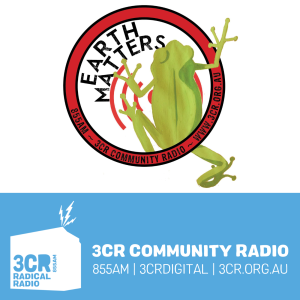

Episode List

First Nations Voices on Climate Justice
On today’s show, we hear from two first nations advocates from the frontlines of the climate battle. They touch on climate change impacts in their communities; their fight to protect Country, and why First Nations voices must be front and centre. Rosaline Parker is a Pasifika advocate and cultural consultant based in Western Sydney. Her work includes empowering young pacific leaders to engage in meaningful advocacy, as well as climate justice initiatives in Tuvalu and Kiribati, in partnership with the Tuvalu Climate Action Network. Kabay Tamu was one of eight Torres Strait Islanders who took a world-first human rights case against the Australian government for its inaction on climate change. He is a Councillor for the Torres Strait Island Regional Council and advocates for the rights of islanders through the Our Islands Our Home campaign.This webinar was organised by seed national Indigenous climate network. Earth Matters #1522 was produced by Mia Audrey.

Toxic Waste on Stolen Land
This episode of Earth Matters investigates the toxic legacy of waste on stolen Aboriginal land, from the radioactive scars of nuclear testing and uranium mining to the invisible spread of PFAS “forever chemicals” in our waterways. Drawing on stories from Maralinga, Kakadu, and the Blue Mountains, and with a personal reflection on Wreck Bay, the program explores how contamination doesn’t just harm health—it severs cultural ties, disrupts food systems, and undermines sovereignty.Through a First Nations lens, we uncover the common thread running through these crises: governments and corporations treating Country as expendable, while communities are left to live with intergenerational impacts. Yet resistance remains strong, from Mirarr opposition to uranium mines, to Barngarla victories against nuclear dumps, to communities fighting for accountability on PFAS.Toxic Waste on Stolen Land is a call to recognise the colonial roots of environmental contamination and to stand with First Nations peoples demanding justice, protection of Country, and an end to sacrifice zones.

Seed; Australia's indigenous youth climate action movement; their achievements and plan to ban fossil fuels.
Georgia and Angel from Seed introduce Australia’s indigenous youth climate action movement, their activities, and strategic plan for the next three years and goals to:to ban fracking in the Kimberley,a ban on fossil fuels across the continent,a significant presence at COP31 train 500 young peopleand more !Donate here to help Seed achieve its goals

Ngarrindjeri shellfishing on Coorong affected by algal bloom
This week on Earth Matters we put the spotlight on the devastating South Australian algal phenomena that is rocking communities and scientists. While the causes of the bloom are becoming clearer, there are many unknowns, making the future difficult to predict. Ngarrindjeri elder Derek Walker is among the many facing uncertainty arising from the bloom. He is a sustainable fisherman harvesting kutis - or pipis - as they are more widely known - on the Coorong. Shellfishing has been a part of Ngarrindjeri life for millenia. But with toxins infiltrating the seafloor where the kuti grow, operations are in shutdown and the local Ngarrindjeri who work there are off the water. Derek Walker speaks about the impact of the algal bloom on kuti harvesting, cultural tourism and community. In this episode of Earth Matters we speak to:- Ngarrindjeri elder and Kuti and Co director, Derek Walker - Dr Scott Bennett, marine ecology expert from the University of Tasmania (interview conducted by 3CR Breakfast presenter Sonia Randhawa) SA Government Fact Sheet SA Government Advice (including health and food safety advice)

Systemic feminist changes and climate action.
Dr. Radha Wagle started in life herding goats in a Nepalese village. She tells her story, how she came from there to lead Nepal's delegation in international climate negotiations. Radha somehow manages to find humour in the challenges women face in leadership roles within environmental sectors.Sophia Harderfeldt talks about the need for feminist system change to ensure women's voices are heard and outlines some practical ways to achieve that.Guests:Dr Radha Wagle – Biodiversity and Climate Adaptation Specialist, Glen Eira City Council, Victoria; formerly Director General, Department of Plant Resources, Ministry of Forests and Environment, Nepal.· Sophia Harderfeldt – Policy and Research Manager, ActionAid Australia.Earth Matters #1518 was produced by Bec Horridge in collaboration with the Womens Climate Congress
Create Your Podcast In Minutes
- Full-featured podcast site
- Unlimited storage and bandwidth
- Comprehensive podcast stats
- Distribute to Apple Podcasts, Spotify, and more
- Make money with your podcast


